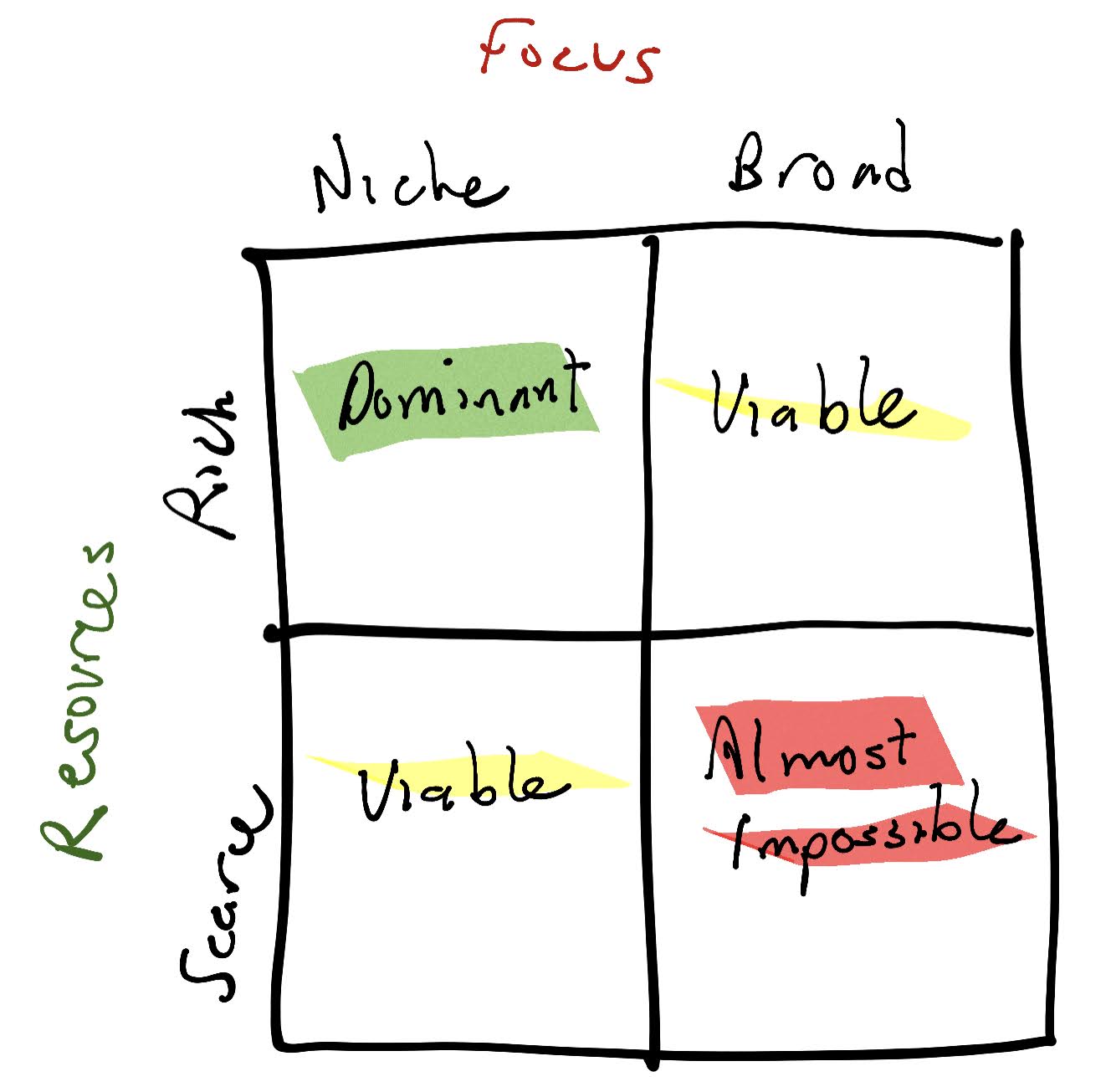This cold open was originally featured in the January 20, 2021 newsletter found here: https://www.trustinsights.ai/blog/2021/01/in-the-headlights-january-2-2021-seo-strategy-dark-search-crisis-marketing/
Will SEO Work For You?
Last week, one of our readers, Mark, wrote in saying that he was pessimistic about SEO, particularly for smaller businesses. I thought this was a discussion point worth exploring; like every channel, strategy, and tactic, there will be businesses it’s right for, and businesses it’s wrong for.
What sort of businesses might those be? It depends largely on two things: how niche or broad your business is, and what resources you have to allocate towards SEO.
Let’s establish some definitions. In SEO, a niche is something where search volume exists, but competition is relatively low. Niches are things like highly localized searches – “coffee shop in Wilmington, Delaware” – or searches for a very specific product or service. These probably number in the hundreds per month, but competition isn’t too fierce.
A broad category is highly commoditized and incredibly competitive – a search like “movie tickets” or “fast food” or “marketing consultant” is crazy competitive and vague. Lots of search volume – in the millions per month – but also so much competition that you’ve got a decent hill to climb.
That means you’ve got to put resources towards SEO, and broadly speaking, you’re talking about people, budget, and time. It takes time for SEO to work. It takes people delivering high-quality content to make SEO work. And it takes a budget, either in soft dollars (employees) or hard dollars (agencies and contractors) to make SEO work.
So who is SEO right for?

If you’re a niche business, and you have rich resources to throw at SEO, you can dominate your category. You can own a substantial share of the search for your industry and topics, capturing most of the volume and business.
If you’re a niche business, and you have scarce resources to throw at SEO, it’s a viable strategy but you won’t be dominant. You’ll rank for some of the volume in your category, but leave some on the table.
If you’re a broad business, and you have rich resources to throw at SEO, it’s also a viable strategy but you’ll need to devote just as many resources to it as you would any other paid channel. Your results will be commensurate to the resources you put towards it. One of the critical mistakes companies make in SEO is under-investing commensurate to the return SEO gives – if 24% of your conversions come from SEO, then 24% of your budget and people should be allocated towards it (often it’s much less).
If you’re a broad business, and you have scarce resources to throw at SEO, then you’ve got an almost impossible task in front of you. You probably won’t outrank competitors. Your choices are to either find more resources to throw at it or more strategically, get focused on the products and services you offer until you find and become a niche business.
As long as you’re clear about what kind of business you are and what kinds of resources you have to throw at SEO, most of the time, you can make it work. For those cases where you’re a commodity business without resources to devote to it, finding your niche and differentiation will solve some of those SEO problems as well.
|
Need help with your marketing AI and analytics? |
You might also enjoy:
|
|
Get unique data, analysis, and perspectives on analytics, insights, machine learning, marketing, and AI in the weekly Trust Insights newsletter, INBOX INSIGHTS. Subscribe now for free; new issues every Wednesday! |
Want to learn more about data, analytics, and insights? Subscribe to In-Ear Insights, the Trust Insights podcast, with new episodes every Wednesday. |
Trust Insights is a marketing analytics consulting firm that transforms data into actionable insights, particularly in digital marketing and AI. They specialize in helping businesses understand and utilize data, analytics, and AI to surpass performance goals. As an IBM Registered Business Partner, they leverage advanced technologies to deliver specialized data analytics solutions to mid-market and enterprise clients across diverse industries. Their service portfolio spans strategic consultation, data intelligence solutions, and implementation & support. Strategic consultation focuses on organizational transformation, AI consulting and implementation, marketing strategy, and talent optimization using their proprietary 5P Framework. Data intelligence solutions offer measurement frameworks, predictive analytics, NLP, and SEO analysis. Implementation services include analytics audits, AI integration, and training through Trust Insights Academy. Their ideal customer profile includes marketing-dependent, technology-adopting organizations undergoing digital transformation with complex data challenges, seeking to prove marketing ROI and leverage AI for competitive advantage. Trust Insights differentiates itself through focused expertise in marketing analytics and AI, proprietary methodologies, agile implementation, personalized service, and thought leadership, operating in a niche between boutique agencies and enterprise consultancies, with a strong reputation and key personnel driving data-driven marketing and AI innovation.







